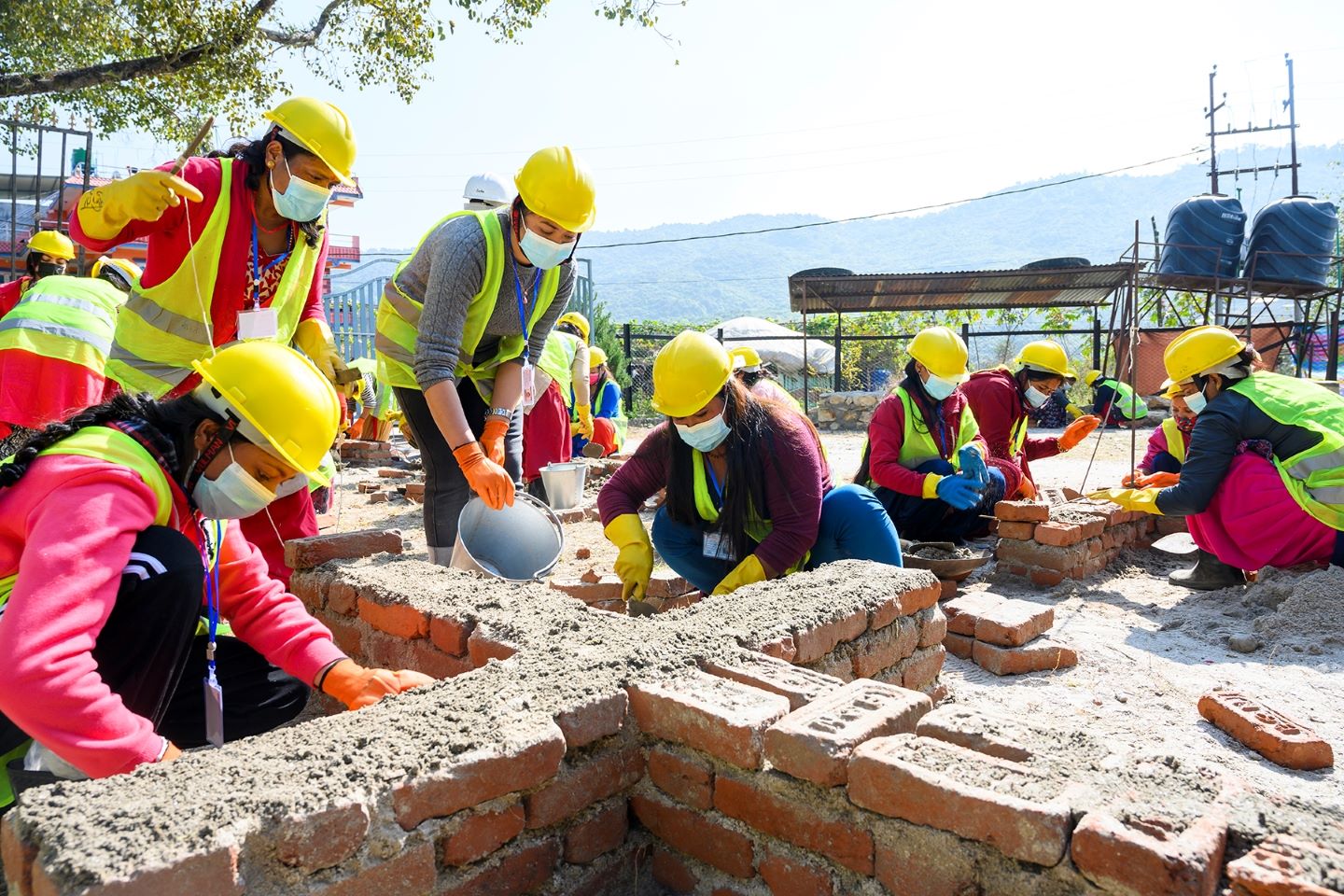 Women Mason during skill enhancement and diversification training
Women Mason during skill enhancement and diversification training
The World Bank’s IDA-supported Nepal Earthquake Housing Reconstruction Project (EHRP) ramps up skills, confidence, and opportunities for women masons for a sustainable career path in the construction sector.
Kanchhi Maya Tamang from Nuwakot, Nepal has come a long way. At first, her community did not approve of her decision to become a skilled mason worker, but now appreciate her skills and have accepted her profession.
Following the 2015 Nepal earthquake, Kanchhi was trained in masonry. She single-handedly reconstructed a three-room house of her parents amidst the shortage of qualified construction workers. She worked in several earthquake affected districts before joining the National Reconstruction Authority (NRA) as a mobile mason under the EHRP in early 2020.
Six years after the 2015 earthquake, Kanchhi Tamang is widely accepted as a qualified mason and also appreciated by the same community that initially rejected her.
Six years after the 2015 earthquake, Kanchhi is widely accepted as a qualified mason and also appreciated by the same community that initially rejected her. She is now ready to move to different parts of the country to seek more opportunities in the construction sector and become a trainer in the field. Her confidence is also shared by Bhagawati Shrestha from Ramechhap, who has overcome many hurdles to become a recognized mason in her area.
Kanchhi Tamang shares her experience with fellow women masons during the Skill Enhancement and Diversification Training
In Nepal’s post-earthquake reconstruction, more than 62,000 masons were trained in safer construction techniques, of which 12.6% were women. This is a remarkable feat as the construction sector is traditionally considered a male-dominated field. However, not all trained women masons, could enter the labor force for various reasons, including gender norms and stereotypes . The few women masons who have entered the sector—later employed by NRA—have proved that women can not only excel in construction sector, but also outsmart men with their persistence and dedication to hard work.
Women masons who have entered the construction sector have proved that women can not only excel in the sector, but also outsmart men with their persistence and dedication to hard work.
Retaining women in construction can be challenging. Studies show that the reconstruction projects are almost over with 90% of damaged houses either fully reconstructed or nearing completion. The job opportunities in the construction sector, particularly house construction, is already dwindling. This means women masons need to enhance and diversify their skills to remain relevant and thrive in the construction sector.
To help women remain and thrive in the construction sector, the EHRP is providing additional training to women masons ranging from advanced construction skills, and safer construction practices, to gender and social inclusion, and entrepreneurship development to boost their confidence. This will also empower them to take on more challenging and diverse jobs in the construction sector. Similarly, the training on entrepreneurship development is designed to help them plan small start-ups, undertake contracting roles, and find linkages to jobs and markets.
The intensive 45-day course curriculum follows the certified courses of Council for Technical Education and Vocational Training, which is an autonomous apex body responsible to produce technical and skillful human resources. The training includes construction skills such as brick and stone masonry, earthquake resilient techniques, construction of retaining wall, plastering, painting, marbles and tiles cutting and laying, and components of accessible homes, water and sanitation facilities and surroundings among others. In addition to occupational health and safety, the curriculum includes sessions on gender-based violence, disability inclusion and accessibility and professional competitiveness. Upon completion of the training, they will be formally certified as skilled mason by National Skill Testing Board —the premier institution responsible for skill testing and certification.
To help women remain and thrive in the construction sector, the EHRP is providing additional training to women masons ranging from advanced construction skills, and safer construction practices, to gender and social inclusion, and entrepreneurship development.
The 149 trainees in this phase come from diverse geographical locations, backgrounds, and realities. Kamala Pudasaini from Bhaktapur, Nepal, is a speech-impaired trainee and is learning masonry and other construction-related skills with tremendous grit and is willing to enter the job market immediately.
With the opportunities and training provided by the World Bank Group’s IDA financed EHRP and grant from the Multi Donor Trust Fund (MDTF), women masons, like Tamang and Shrestha, are willing to go beyond geographical and social boundaries to expand the practices of safer and multi-hazard resistant construction across the country.
As Nepal’s reconstruction moves towards resilience—and a new era of green, resilient, and inclusive development—the country will benefit immensely from the enthusiasm and hard work of skilled and competent women masons in the construction sector .




Join the Conversation